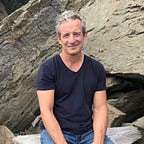Zen and the Art of Science-Humanities Integration
A journey from New Jersey to California, and from the sciences to the humanities and back
As a teenager I’d always taken a keen interest in science. After drifting from molecular biology to marine ecology in my early undergrad days, however, my life underwent a dramatic shift, both physically and intellectually. In 1998 I dropped out of college in New Jersey, where I was born and had spent my entire life up to that point, and rode my motorcycle to San Francisco. The fact that I had copies of both Zen and the Art of Motorcycle Maintenance and Kerouac’s On the Road in my saddlebags gives a sense of my state of mind.
Even as a child I was intensely attracted to the color and aesthetics of the Northern California landscape, which I’d only seen in photos. For years I had an enormous poster of the California coast on my bedroom wall. Rolling into San Francisco one evening on the Bay Bridge as all the buildings in downtown began to light up, the reality proved to be even better. I vowed I’d never leave.
Switching my academic focus to the humanities — primarily the classical Chinese language and religious and philosophical studies — I graduated from Stanford with a B.A. in Chinese, having also taken a year of language training in Taiwan. Halfway through a graduate program in Chinese at UC Berkeley, however, I realized that I was more interested in comparative philosophy and religion than sinology per se, and left with a MA in classical Chinese to return to Stanford. I earned my Ph.D. in Religious Studies in 1998, with a dissertation on early Chinese philosophy, but also with broad training in comparative thought, virtue ethics and hermeneutics (philosophy of interpretation).
As a student I supported myself by working in bars and restaurants. This gave me my introduction to wine, which became a lifelong passion, and also insight into the role of alcohol in human sociality. I think living and working in San Francisco while commuting to school was also instrumental in cementing my aversion to relativistic—and anti-scientific—postmodernist theory that dominated my peers. While my fellow grad students who never left campus could allow themselves to be convinced by Derrida that were we all nothing but free-floating signifiers, my varied and demanding non-academic life kept me grounded in reality.
Exiled from the Bay Area by the realities of the academic job market, my goal in getting a permanent job was to stay as close to the Bay Area as I could, at least on the West Coast, and I succeeded. My first tenure-track job was at the University of Southern California in LA. In 2005 I moved to the University of British Columbia in Vancouver, Canada, where I am currently Distinguished University Scholar and Professor of Philosophy, with appointments in Psychology and Asian Studies
Though still exiled from the San Francisco Bay Area, several years ago I purchased a vacation home in Mendocino County, which I get to as often as possible to soak in the Northern Californian landscape , garden, fish and also engage in one of my favorite hobbies, extreme ocean kayaking (essentially, white water kayaking in the ocean, playing on waves rather than river currents).
My work today is radically interdisciplinary, combining my original training (early Chinese thought, classical Chinese, comparative religion, virtue ethics) with knowledge and methods I picked up after graduate school (cognitive linguistics, gene-culture co-evolution theory, cognitive science, social psychology), as well as new methods that didn’t even exist when I was in graduate school (large-scale textual analysis, massive cross-cultural databases).
In my 2008 What Science Offers the Humanities, I make a theoretical case for why humanities scholars should draw upon both methods and theories from the natural sciences when appropriate. I think that my latest book, Drunk: How We Sipped, Danced and Stumbled Our Way to Civilization, is a good illustration of what this would look like in practice: exploring big questions (why do people like to drink?) with any tool necessary, ranging from history, archaeology, anthropology and literature to social psychology and neuroscience.
This is maybe a long way from Zen and the Art of Motorcycle Maintenance, but I think my teenage self would be happy with how things turned out. And I took it as significant that one of the major businesses in the small town next to where I landed on the California coast is this one:
Edward Slingerland is Distinguished University Scholar and Professor of Philosophy at the University of British Columbia, and the author of Drunk: How We Sipped, Danced and Stumbled Our Way to Civilization.
